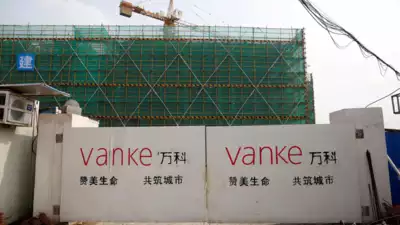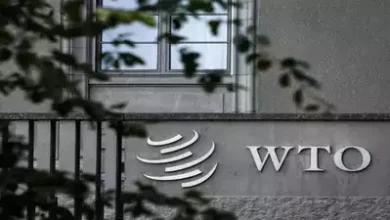Property problems in China worsen because to the Vanke recession and the rural garden stop
With the country’s real estate crisis showing no signs of abating, two of China’s largest real estate companies announced historic profit declines and postponed their quarterly reports.
Formerly the top home builder in the country by sales, Country Garden Holdings Co. unexpectedly announced late Thursday that it would miss the deadline for submitting its annual results because it needed additional data.

Formerly the biggest listed developer, China Vanke Co., said that its net profit dropped 46% in the previous year, the most since it was public in 1991.
The alarming remarks highlight how low consumer confidence and a faltering economy continue to affect house sales in the second-biggest economy in the world, combined with an increase in bad loans at some banks. February saw a sharp decrease in annual prices for both new and used houses, underscoring the difficulty facing regulators in their efforts to rescue the struggling market.
According to Raymond Cheng, director of China property analysis at CGS International Securities HK, China’s real estate market “will probably register the first net loss since our coverage.” We will continue to be cautious in this area until developer sales pick up.
Few businesses, whether state-sponsored or private, have escaped the slump. Only a year ago, Country Garden and Vanke were both heralded as possible survivals. When Country Garden defaulted on its dollar debt in October, it caused a stir in the markets. Vanke is attempting to prevent default by negotiating with debt insurers.
Country Garden said that the company anticipates delaying the release of its 2023 results beyond the authorities’ March 31 deadline. The company said in a filing that the delay would probably lead to a trading halt on April 2, the day the Hong Kong market reopens after Easter.
The delay indicates that the developer’s problems are about to take a new turn after a creditor filed a petition with a Hong Kong court to wind up the business after it defaulted on a dollar loan. This month, the corporation also failed to make a coupon payment on a Yuan bond for the first time.
According to a research note by Bloomberg Intelligence analyst Kristy Hung, the action “suggests new impediments to its restructuring, with any delays to its debt plan likely to fuel concerns of lawsuit risk.”
According to the filing, Country Garden said that it needed additional time to gather data in order to “make appropriate accounting estimates and judgements and reasonably reflect changes in the industry.”
Meanwhile, Vanke said that for 2023, net income attributable to shareholders decreased to 12.2 billion yuan ($1.69 billion). The decline far outpaces the 14% decline predicted by Bloomberg’s panel of experts.
The massive builder said that as it “firmly deleverages,” it hopes to reduce debt by more than 100 billion yuan over the next two years. Vanke skipped a full-year payment for the first time since its 1991 listing in the China market by declining to provide a cash or stock dividend.
Vanke’s shares fell 3.8% on Friday, hitting a low point in Shenzhen that was almost ten years ago. Recently, the price of some of its longer-dated bonds was close to 40 cents, which is a very distressed level. Vanke’s $600 million bond, which is due in June, is trading above 90 cents, suggesting that investors are less concerned about short-term repayment.
In an online conference on Friday, Vanke’s President Zhu Jiusheng said that the business has 26 financial partners and that it has sufficient financial backing from banks.
As the real estate downturn enters its fourth year, the erstwhile titans, together with mid-sized developers, provide a window into the worst earnings season ever for the industry. According to estimates by Bloomberg, of the 23 real estate developers who have disclosed their profitability, 14 have declared a net loss and six have reported declining profits. Only three saw a little increase in profit.
China’s troubled developers reveal widespread losses.
As the number of bad loans increases due to the prolonged property slump, the main state banks’ balance sheets are being negatively impacted, which may have an impact on the financial industry. Beijing assigned state-owned banks the responsibility of backing indebted real estate developers and stimulating the domestic economy.
According to Bank of Communications Co., its percentage of non-performing loans in real estate increased to 4.99% at the end of 2018 from 2.8% the previous year. Residential mortgage bad debts at larger competitor, Industrial & Commercial Bank of China Ltd., increased by 9.6%. Last year, the number of residential mortgage loans that deteriorated increased by 4.7%, according to Agricultural Bank of China Ltd.
An ever-growing number of developers are at risk due to a prolonged downturn in house sales. Even if month-over-month price drops somewhat abated, the fall in home sales continued to worsen in February. Some global credit rating agencies have downgraded some companies, notably Vanke and Longfor Group Holdings Ltd., into junk territory due to the decline in sales.
On Thursday, Fitch Ratings lowered its predictions for the housing market, currently projecting a 5%–10% decline in new house sales this year due to a decline in demand for home purchases. The ratings agency had earlier predicted a drop of 0% to 5%.






